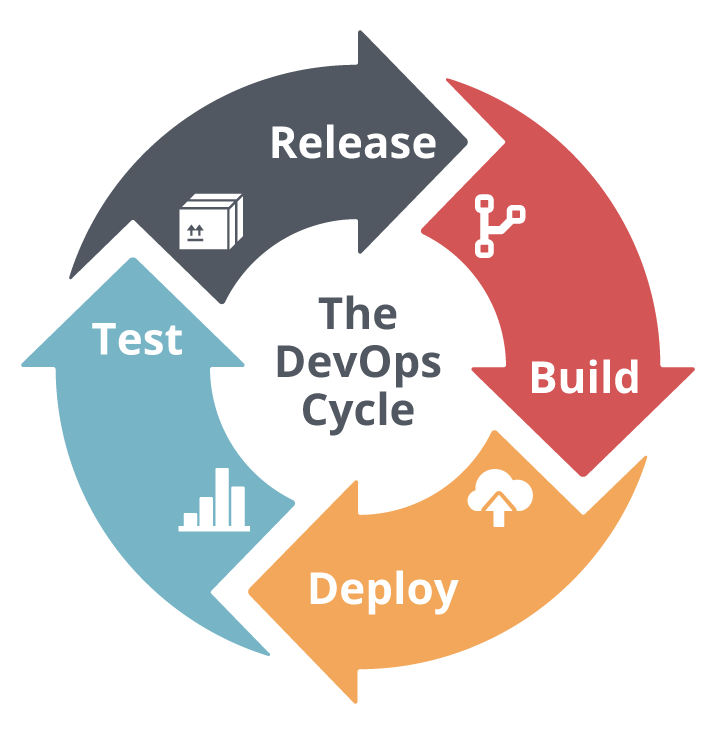
Digitization is sweeping across many industries, creating an unparalleled demand for companies to innovate, experiment and deliver capabilities faster. Increasing speed and agility isn’t just a desire—it’s imperative for survival. You need to adopt a more flexible and efficient approach to software delivery—one that eliminates the barriers and exploits the dependencies between development and operations. And for that, you can adopt a DevOps culture.
In a DevOps environment, your entire team is responsible for delivering both new features and stability. Instead of simply creating code and turning it over to an operations team to put into production, responsibilities are balanced more equally, with procedures in place to make sure both teams have insight and visibility into application performance.
Not surprisingly, DevOps practices continue to gain in popularity. According to data from DevOps.com, the adoption rate increased substantially from 2015 to 2016, from 66 percent to 74 percent.
What’s driving the shift? Long lead times to get software into production make it difficult for companies to provide cutting-edge services and enhance the customer experience. To keep pace with the market demands, IT teams must build, deploy, test, and release software in ever-faster cycles.

Here are six reasons why you should consider adopting a DevOps culture:
1. Accelerate innovation
With an integrated operations and development team, applications can be developed and deployed much more rapidly. This is vital, since business success today hinges largely on an organization’s ability to innovate faster than the competition. Since change sets are smaller, problems tend to be less complex. DevOps engineers can take advantage of real-time performance data to quickly grasp the impact of application changes. And software fixes are faster because team members only need to check the latest code changes for errors.
2. Improve collaboration
Rather than attempting to eliminate the difference between the two disciplines, a successful DevOps environment promises to build a bridge to make them work better together. The software development culture then, continuously focusses on combined achievement rather than individual goals. When your software and operations teams trust each other, they can experiment, research, and innovate more effectively. It’s no longer a matter of tossing application code over the wall and hoping for the best. Your development environment becomes progressively more seamless as all team members work toward shared goals.
3. Increase efficiency
Automated tools and standardized production platforms are key elements of DevOps best practices which help make deployments more predictable and free your IT staff from tedious repetitive tasks. With automated testing and integration, developers need not fritter away their time relying on code integration processes to complete.
Acceleration and development platforms offer additional opportunities for improving efficiency:
- Scalable infrastructure, such as cloud-based solutions, help speed testing and deployment processes by increasing access to hardware resources.
- Compilation and development tools help shorten development cycles and speed product delivery.
- Continuous delivery workflows can help produce faster and more frequent software release.
4. Reduce failures
The shorter development cycles associated with a strong DevOps approach promotes more frequent code releases. With these more modular implementations, your teams can expose problems in configuration, application code, and infrastructure earlier. DevOps also keeps team members engaged throughout the life cycle of a feature or application, resulting in higher quality code. Fewer fixes are required because developers look for and eliminate potential problems as they write code. According to a recent State of DevOps report, organizations that adopt a DevOps culture have 60 times fewer failures than those not implementing a DevOps approach.
5. Accelerate recovery time
Because DevOps deployments are more targeted and isolated, bugs are easier to spot and in turn, fixes are often faster and easier to implement. Your team will mostly need to check the latest code changes to be able to resolve an issue. Resolution times are inherently faster because the responsibility for troubleshooting and fixes remains contained within a single team. In fact, research shows that high-performing DevOps teams recover from failures 168 times faster than lower performing peers.
6. Enhance job satisfaction
Rather than rule-based or power-based culture, DevOps promotes a more performance-based company environment. This reduces the bureaucratic obstacles and fosters sharing of risks. The result is a more contented and productive workforce, which helps boost your business performance. Developers and operations engineers generally prefer a DevOps environment because they can work more efficiently and wear more than one hat. They gain a better understanding of where their role fits into the larger scope of IT and within the business as a whole. This makes them more marketable and more valuable.
Fast software delivery is crucial in today’s digital age and a DevOps culture is the driver of this process. It enables your business to accelerate go-to-market services and roll out new features quickly and efficiently. While adopting DevOps is not a simple process, when done correctly the investment will pay dividends far beyond the initial effort. With greater speed, security, and stability, a DevOps culture could be just the transformative shift you need to gain an important performance advantage.
Let’s Connect to help you gain the DevOps advantage!



